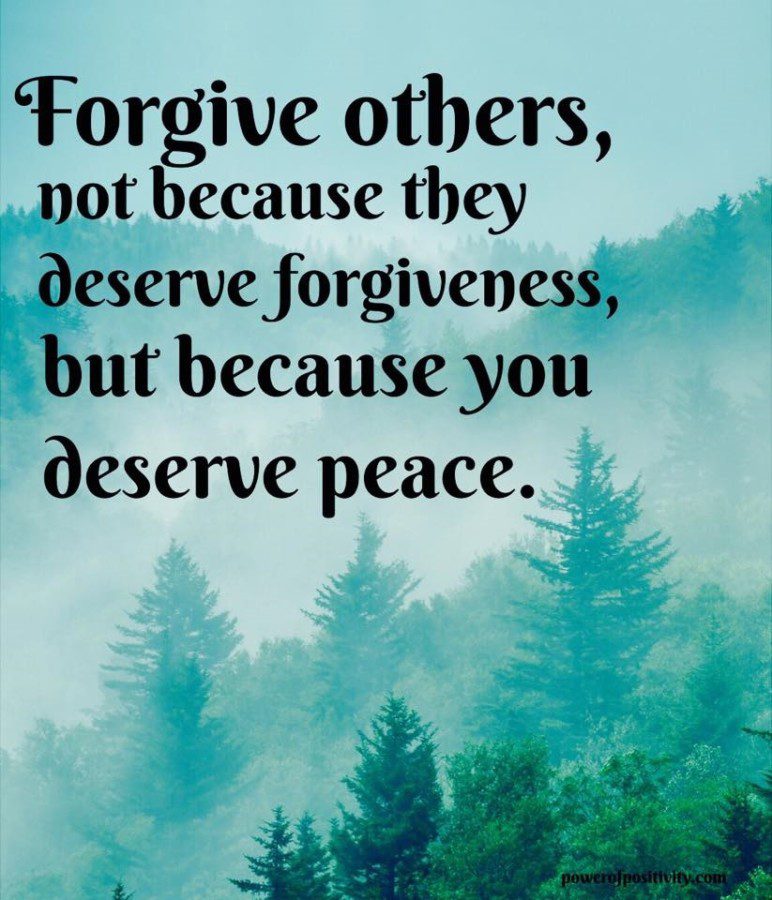Forgiving someone doesn’t always have to be about the other person. When we forgive people, it’s mostly for ourselves and our own peace of mind. “Whether you realize it or not, if you hold on to resentment, you’re living in the past. When we’re fully present today, now, there is no past or future. And nobody’s making us feel bad,” says confidence coach and columnist Susie Moore.
When we forgive someone, it’s usually because they’ve already sought forgiveness from us. But what about when that never happens? What about the people who don’t say “I’m sorry”? Most people would think that they don’t deserve forgiveness, and continue carrying that hurt and pain with them. But there are ways for us to take steps to forgive them anyway. Not just for them, but for ourselves as well.
Here Are 6 Ways To Let Go And Forgive Someone Who Doesn’t Apologize
“Forgive, forget. Bear with the faults of others as you would have them bear with yours.” – Phillips Brooks
1. Focus on yourself rather than others
Forgiving seems to be about absolving the other person of wrongdoing. However, once you flip the focus from other people onto yourself, you’re now learning to heal from within. Allowing yourself to focus on how you feel and what’s best for you will make forgiving someone for your own peace of mind much easier.
“When you decide to forgive someone, you are essentially liberating yourself from the anger and resentment caused by whoever has hurt you. It’s a decision to learn from the betrayal, see your part in it (if there was any) and move on after you’ve processed your feelings sufficiently,” says Dr. Amy Wood.
It only hurts us to hold onto grudges, and the grudges of those who don’t seek forgiveness are often the worst. You’re the only person who should matter when it comes to who and what you have control over.
2. Take responsibility for your feelings
Other people only have so much power over you. While their words and actions can have an effect on us, ultimately, we are in control of our own feelings and behaviors. Taking responsibility for our own feelings is a way to stop blaming others for how we feel, and start moving past those negative feelings. When we stop feeling hurt by others, we lose both the blame and judgement that keeps us trapped by our grudges.
“By changing the way you choose to perceive the power that others have over you… you’ll see a bright new world of unlimited potential for yourself… you’ll know instantly how to forgive and let go of anything,” says Dr. Wayne W Dyer.
Recognize that you are the only person who has complete control of your feelings, and by doing so, you become able to free yourself of all negativity.

3. Accept responsibility
Not everything is one-sided. Because we can only see our own perspective, we often find that we perceive other people to be the wrong, judgmental ones. We don’t see that we could have done something to provoke their cold and icy personality. Accepting responsibility for the part you may have played in a grudge or argument means you’ll be able to let go of how the other person is acting much quicker. You may even be able to seek to reconcile the problem, and accepting your responsibility will make the other person more likely to reconcile.
4. Stop living in the past
When you refuse to release a grudge or past anger, you’re not able to fully live in the present. You may find that you’re always thinking back to the people who slighted you and you made you feel this way. When you keep thinking back and experiencing emotions that have long passed, you’re not giving your full self to the things in the present that need your attention.
“Research also shows that people who hold onto chronic unforgiveness experience long-term stress, which affects your immune system, making it more difficult to fight off disease. Harmful thoughts have negative health ramifications. Forgiveness allows you to let go, not take things as personally and find true acceptance, even in the midst of chaos or trauma,” says divorce attorney-mediator, Lori S. Rubenstein, JD, PCC.
So, take a deep breath and start living in the now. Once you find peace in your present life, you’ll be much more capable of letting go of the grudging and forgiving people who haven’t said sorry.
5. Don’t look to feel slighted
Sometimes, we deliberately look for reasons to be offended. Righteous anger can feel good sometimes, and we all know those people who are a little bit addicted to the feeling. But in that same vein, going through life looking to be slighted can mean gathering grudges that will never be met with an apology. Letting some of these things go and not allowing yourself to feel offended over every little thing will mean that you’re going to be able to forgive things much easier.
6. Look at life with a loving lens
This doesn’t mean that you have to look at all of the bad things with love, but rather take all of the things that happen in your life and turn them into a lesson for you to learn something from.
Late professor Lewis B. Smedes once said, “Forgiving does not erase the bitter past. A healed memory is not a deleted memory. Instead, forgiving what we cannot forget creates a new way to remember. We change the memory of our past into a hope for our future.”
Therefore, if someone causes you harm, don’t hold the grudge. Look at what happened and learn from the experience. Do you need to be less tolerant of people walking all over you? Or do you need to learn to accept people for who they are? Whatever the lesson, take it and internalize it so you can keep moving forward in life.
Final thoughts
Forgiveness doesn’t have to be something that absolves another person of guilt at the expense of your own emotions. Rather, forgiveness should be something that helps heal you from the past and help you move forward. When you forgive someone who isn’t going to say sorry, it’s a way help heal your mind and soul. It’s “… a wonderful way to honor yourself. It affirms to the universe that you deserve to be happy,” says marriage and family therapist Andrea Brandt, Ph.D.

















